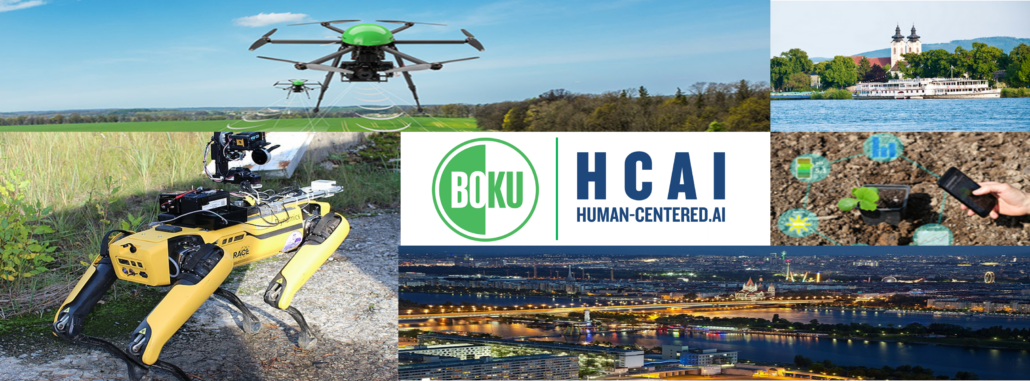Antrittsvorlesung Andreas Holzinger “Digital Transformation for Smart Farm and Forest Operations needs Human-Centered AI”
“Human-Centered AI” = “Künstliche Intelligenz mit Hausverstand”
Youtube Video (Lecture starts at 00:18:18)
When: Monday, November, 7, 2022 18:00
Where: UFT-Tulln, Konrad-Lorenz-Str. 24, A-3430 Tulln an der Donau, Lower Austria, Greater Vienna Area – [local map]
Take train REX 41 – 22 minutes from Heiligenstadt to Tulln Bahnhof – exit to the south (Messe, Haus der Digitalisierung) and follow the signs Technopol Campus
Venue: UFT Aula (ground floor) – scroll down for a local map and photo of the building
Download the invitation here: Mo-7-NOV-2022-1800-Einladung-Antrittsvorlesung-Holzinger (pdf, 246 kB)
Digital Transformation – Human-Centred AI
The main impetus for the global effort of the current digital transformation in almost all domains of our daily lives is due to the great successes of Artificial Intelligence (AI) and in particular the workhorse of AI, statistical data driven machine learning (ML) – current large language models like ChatCPT is a good current example which is on everyone’s lips today.
The intelligent analysis, modeling, and management of agricultural and forest ecosystems, as well as the use and protection of soils, already play an important role in securing our planet for future generations (One Health principle: a healthy planet for healthy people). Digitalisation is the basis and AI will become irreplaceable in the future, However, the technical solutions must cover the entire value chain and, above all, raise awareness of safety and security.
The process of digital transformation is supported by cyber-physical systems enabled by advances in ML, the availability of Big Data, and increasing computational power. For certain tasks, algorithms today achieve performance that exceeds human level performance. The challenge is to use multimodal information fusion, i.e., to integrate data from different sources (sensor data, images, *omics) and to explain to an expert why a certain result was obtained. However, ML models are often sensitive to even small changes, and perturbations can have dramatic effects on the outcome. Therefore, the use of AI in domains that matter to human life (agriculture, forestry, climate, health, etc.) has led to an increased need for trustworthy AI with two main components: Explainability and Robustness. One step to making AI more robust is to incorporate and leverage expert knowledge. For example, the forester in the loop can often bring experience and conceptual understanding to the AI pipeline. Human-centered AI (HCAI) is a synthesis of “artificial intelligence” and “natural intelligence” to strengthen, augment, and complement human performance – rather than replace humans.
The dramatic newspaper and television headlines about the increasing danger of forest fires, the threat to our forests from pests (e.g. bark beetle) and climate change, with the simultaneous importance of wood as a renewable resource underline the urgency of our issues and need for urgent help from the AI domain !
Most of all it needs a concerted effort towards “One Health” – fully supporting the UNO SDG’s.
URL of this page is https://human-centered.ai/antrittsvorlesung-andreas-holzinger/
18:00
Andreas Holzinger (University of Natural Resources and Life Sciences Vienna
Title: Digital Transformation in Smart Farm and Forest Operations needs Human-Centered AI
Abstract:
Taking forestry as an example, BOKU is challenged with a variety of problems today. We only need to look at the media: The dramatic newspaper and television headlines about the increasing danger of forest fires, the threat to our forests from pests (e.g., bark beetle) and climate change, with the simultaneous importance of wood as a renewable resource underline the urgency of our issues and need for urgent help from the AI domain. Thanks to the enormous progress in the field of statistical machine learning, AI is very successful today, However, two properties need to be further improved in the future: a) robustness and b) explainability, and to put it in a nutshell: future AI needs “Hausverstand”. While Chat-GPT has made AI poular again it demonstrates the urgent need for trustworthy AI. Therefore, the increasing use of sucessful AI in real-world domains has led to an increased demand for trustworthy AI. One approach to making AI more robust is to combine statistical learning with knowledge representations. And that’s where interactive machine learning comes in. For certain tasks, it can be beneficial to include a human in the loop. A human expert (such as a forester) can often bring experience and conceptual understanding to the AI pipeline. Consequently, both explainability and robustness can promote reliability and trust and ensure that humans remain in control, thus complementing – not replacing – human intelligence with artificial intelligence. Human-Centered AI (HCAI) is working on generic methods to promote robustness and explainability to foster secure AI solutions and advocates a synergistic approach to provide human control over AI and to align AI with human values, ethical principles, and legal requirements to ensure privacy, security, and safety. This presentation will show selected examples from forestry but are also transferable to agriculture.
Short Bio:
Andreas Holzinger pioneered in interactive machine learning with the human-in-the-loop promoting robustness and explainability to foster trustworthy AI. He advocates a synergistic approach to Human-Centered AI (HCAI) to align artificial intelligence with human values, ethical principles, and legal requirements to ensure privacy, security, and safety. For his achievements he was elected a member of Academia Europaea in 2019, the European Academy of Science, of the European Laboratory for Learning and Intelligent Systems (ELLIS) in 2020, and Fellow of the international federation of information processing (ifip) in 2021. He obtained his Ph.D. with a topic in Cognitive Science from Graz University in 1998, and his Habilitation (UOG 93, venia docendi) in Computer Science from Graz University of Technology in 2003. Andreas was Visiting Professor for Machine Learning & Knowledge Extraction in Verona (Italy), RWTH Aachen (Germany), and the University College London (UK). From July 2019 until February 2022 Andreas was a Visiting Professor for explainable AI at the University of Alberta (Canada). Andreas Holzinger has been appointed full professor for digital transformation in smart farm and forest operations at the University of Natural Resources and Life Sciences Vienna as of March, 1, 2022.
Personal: aholzinger.at
Scholar: Andreas Holzinger
Slides (pdf, 5.649 kB) : 22-11-07-1800-HOLZINGER-Inaugural-lecture
18:00
Andreas Holzinger (University of Natural Resources and Life Sciences Vienna
Title: Digital Transformation in Smart Farm and Forest Operations needs Human-Centered AI
Zusammenfassung:
Am Beispiel der Forstwirtschaft ist die BOKU heute mit einer Vielzahl von Problemen konfrontiert. Wir brauchen nur einen Blick in die Medien zu werfen: Die dramatischen Zeitungs- und Fernsehschlagzeilen über die zunehmende Waldbrandgefahr, die Bedrohung unserer Wälder durch Schädlinge (z.B. Borkenkäfer) und den Klimawandel bei gleichzeitiger Bedeutung des nachwachsenden Rohstoffs Holz unterstreichen die Dringlichkeit unserer Probleme und den dringenden Bedarf an Hilfe von der Künstlichen Intelligenz (KI).
Dank der enormen Fortschritte auf dem Gebiet des statistischen maschinellen Lernens ist KI heute sehr erfolgreich und auch sehr populär – ChatGPT ist heute in aller Munde. Zwei Eigenschaften müssen jedoch in Zukunft noch weiter verbessert werden: a) Robustheit und b) Erklärbarkeit, kurz gesagt: Künftige KI braucht “Hausverstand”. Während derzeitige Erfolge des statistischen maschinellen Lernens wie z.B. Chat-GPT KI wieder sehr populär machen, zeigt dies erst Recht den Bedarf an Nachvollziehbarkeit, Erklärbarkeit und Vertrauenswürdigkeit. Vertrauen in Ergebnisse ist auch das wichtigste Akzeptanzkriterium zukünftiger KI. Daher hat der Einsatz von KI in realen Bereichen wie der Land- und Forstwirtschaft zu einer erhöhten Nachfrage nach vertrauenswürdiger KI geführt. Ein Ansatz, um die KI robuster zu machen, besteht darin, statistisches Lernen mit Wissensrepräsentationen zu kombinieren. Und hier kommt das interaktive maschinelle Lernen ins Spiel. Bei bestimmten Aufgaben kann es von Vorteil sein, einen Human-in-the-Loop einzubeziehen. Ein menschlicher Experte (z. B. ein Förster) kann oft Erfahrung und konzeptionelles Verständnis in die KI-Pipeline einbringen. Folglich können sowohl die Erklärbarkeit als auch die Robustheit die Zuverlässigkeit und das Vertrauen fördern und sicherstellen, dass der Mensch die Kontrolle behält und somit die menschliche Intelligenz durch künstliche Intelligenz ergänzt – nicht ersetzt – wird.
Human-Centered AI (HCAI) arbeitet an solchen Methoden zur Förderung von Robustheit und Erklärbarkeit, um sichere KI-Lösungen zu ermöglichen, und fördert für einen synergetischen Ansatz, um dem Menschen die Kontrolle über die KI zu geben und mit menschlichen Werten, ethischen Grundsätzen und rechtlichen Anforderungen in Einklang zu bringen, Sicherheit und Schutz zu gewährleisten. Dieser Vortrag zeigt ausgewählte Beispiele aus der Forstwirtschaft, die aber auch auf die Landwirtschaft übertragbar sind.
Kurz Lebenslauf:
Andreas Holzinger leistete Pionierarbeit auf dem Gebiet des interaktiven maschinellen Lernens mit dem Human-in-the-Loop, um Robustheit und Erklärbarkeit für vertrauenswürdige KI zu fördern. Holzinger vertritt einen synergetischen Ansatz menschenzentrierter KI (Human-Centered AI, HCAI), um Mensch und Maschine in Harmonie zu verbinden, um künstliche Intelligenz mit menschlichen Werten, ethischen Grundsätzen und rechtlichen Anforderungen in Einklang zu bringen um Sicherheit und Schutz zu gewährleisten. Für seine Leistungen wurde er 2019 zum Mitglied der Academia Europaea, der Europäischen Akademie der Wissenschaften, des European Laboratory for Learning and Intelligent Systems (ELLIS) im Jahr 2020 und zum Fellow der International Federation of Information Processing (ifip) im Jahr 2021 gewählt. Er promovierte 1998 an der Universität Graz mit einem Thema in Kognitionswissenschaften und habilitierte sich 2003 an der Technischen Universität Graz in Informatik (UOG 93, venia docendi). Andreas Holzinger war Gastprofessor für Maschinelles Lernen und Wissensextraktion in Verona (Italien), an der RWTH Aachen (Deutschland) und am University College London (UK). Von Juli 2019 bis Februar 2022 war Andreas Holzinger Gastprofessor für erklärbare KI am xAI Lab des Alberta Machine Intelligence Institutes der University of Alberta (Kanada). Andreas Holzinger wurde mit Wirksamkeit zum 1. März 2022 zum ordentlichen Professor für Digitale Transformation in intelligenter Land- und Forstwirtschafts an der BOKU Universität für Bodenkultur Wien ernannt.
Homepage: aholzinger.at
Scholar: Andreas Holzinger
Slides: 22-11-07-1800-HOLZINGER-Inaugural-lecture



